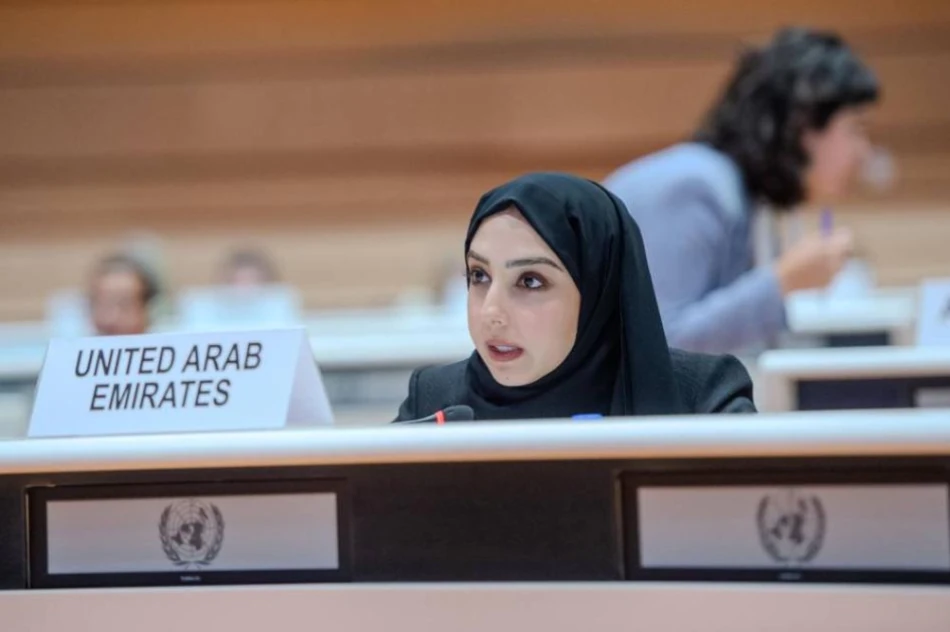
UAE Reaffirms Commitment to Ensuring Education for All
UAE Pushes for Global Education Protocol as Part of Strategic Soft Power Initiative
The United Arab Emirates is positioning itself as a champion of children's education rights on the global stage, announcing ambitious commitments at a UN working group meeting in Geneva focused on developing an optional protocol to the Convention on the Rights of the Child. The move reflects the UAE's broader strategy to establish itself as a humanitarian leader while diversifying its international influence beyond oil and trade.
Constitutional Commitment Drives Policy
Speaking at the UN European headquarters from September 1-3, 2025, Hajar Ahmed Al Dhaheri, Secretary-General of the Council for Education, Human Development and Society, emphasized that education represents a constitutional right in the UAE rather than merely a policy priority. This legal framework has enabled the country to provide free and compulsory education through secondary school for all citizens, with higher education also offered at no cost.
The UAE's domestic education model extends beyond citizens to include equitable opportunities for residents of all nationalities, with specific provisions for children with disabilities and those from low-income families. This inclusive approach contrasts with education systems in other Gulf states, where access often depends more heavily on citizenship status.
International Education Diplomacy Takes Center Stage
The UAE's international education commitments represent a significant component of its foreign aid strategy, particularly in crisis-affected regions. At the Global Partnership for Education donor pledging summit in July 2021, the country committed $100 million to support educational programs in developing nations.
Strategic Timing and Global Context
This education diplomacy comes as traditional education systems worldwide face unprecedented challenges from digital transformation, climate displacement, and economic inequality. The UAE's emphasis on early childhood education within the UN framework positions it ahead of countries that focus primarily on primary and secondary education access.
The timing also coincides with increased competition among Gulf states to establish humanitarian leadership. While Saudi Arabia focuses on Vision 2030's domestic transformation and Qatar leverages sports diplomacy, the UAE is carving out education as its distinctive international niche.
Market and Investment Implications
For investors and policymakers, the UAE's education commitments signal several trends worth monitoring. The country's focus on inclusive, technology-integrated education systems creates opportunities in EdTech, infrastructure development, and teacher training programs. International education companies may find the UAE an attractive partner for expanding into emerging markets, given its $100 million commitment and established aid delivery mechanisms.
Sustainable Development Goals as Economic Strategy
Al Dhaheri's emphasis on achieving Sustainable Development Goal 4 (quality education for all) reflects the UAE's recognition that education investment drives long-term economic competitiveness. Countries like Singapore and South Korea have demonstrated how education excellence translates into economic transformation—a model the UAE appears to be adapting for both domestic development and international influence.
Looking Ahead: Protocol Development and Implementation
The working group meeting, chaired by Deputy High Commissioner for Human Rights Nada Al-Nashif, represents preliminary discussions rather than binding commitments. However, the UAE's active participation suggests it sees potential advantages in helping shape international education standards, particularly as global education needs evolve rapidly.
Success in this initiative could establish the UAE as the go-to partner for education-focused development projects, creating sustainable diplomatic relationships that extend beyond traditional economic partnerships. This approach mirrors how Nordic countries built international influence through development aid, but adapted for a Middle Eastern context where education access remains a critical challenge.
Most Viewed News

 Omar Rahman
Omar Rahman






